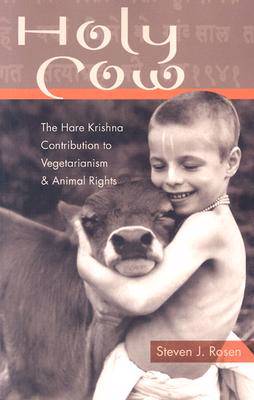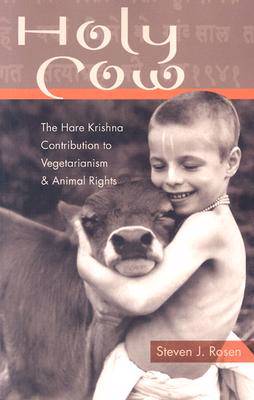
- Retrait gratuit dans votre magasin Club
- 7.000.000 titres dans notre catalogue
- Payer en toute sécurité
- Toujours un magasin près de chez vous
- Retrait gratuit dans votre magasin Club
- 7.000.0000 titres dans notre catalogue
- Payer en toute sécurité
- Toujours un magasin près de chez vous
Holy Cow
The Hare Krishna Contribution to Vegetarianism and Animal Rights
Steven Rosen
Livre broché | Anglais
20,95 €
+ 41 points
Description
Hinduism scholar Steven Rosen explores the world of the Hare Krishna movement, which has been instrumental in raising awareness of vegetarianism and the plight of animals in the United States. Holy Cow begins by introducing the Hare Krishna movement and of its colorful singing and dancing, its book distribution program, and especially its restaurants, sacred food distribution, and delicious vegetarian cuisine. Rosen returns to the early days of Indian culture, to a time when daily life was based on Vedic principles and scriptural wisdom, and shows how vegetarianism and animal rights were endorsed by the Vedic texts. Rosen reveals how a tension was created by a concomitant endorsement of animal sacrifices in ancient Indian culture, a tension that led in part to the beginnings of Jainism and Buddhism. Rosen then examines the rise of Vaishnavism--the worship of the god Vishnu, or Krishna--and how Vaishnavites were sympathetic to vegetarianism and animal rights, showing the link between the contemporary Hare Krishna movement (ISKCON), founded in the 1960s, and the ancient Vaishnavaites and all that they have accomplished in between. Rosen looks at the "Food for Life" program, the restaurants and cookbooks, and the various forms of writing about vegetarianism and animal rights. The book also includes recipes for those who wish to taste Krishna. In conclusion, Rosen illustrates how deeply Hare Krishna devotees have influenced the contemporary vegetarian movement and its call for ahimsa, or nonviolence, toward all living beings.
Spécifications
Parties prenantes
- Auteur(s) :
- Editeur:
Contenu
- Nombre de pages :
- 222
- Langue:
- Anglais
Caractéristiques
- EAN:
- 9781590560662
- Date de parution :
- 20-12-19
- Format:
- Livre broché
- Format numérique:
- Trade paperback (VS)
- Dimensions :
- 163 mm x 230 mm
- Poids :
- 376 g

Les avis
Nous publions uniquement les avis qui respectent les conditions requises. Consultez nos conditions pour les avis.






